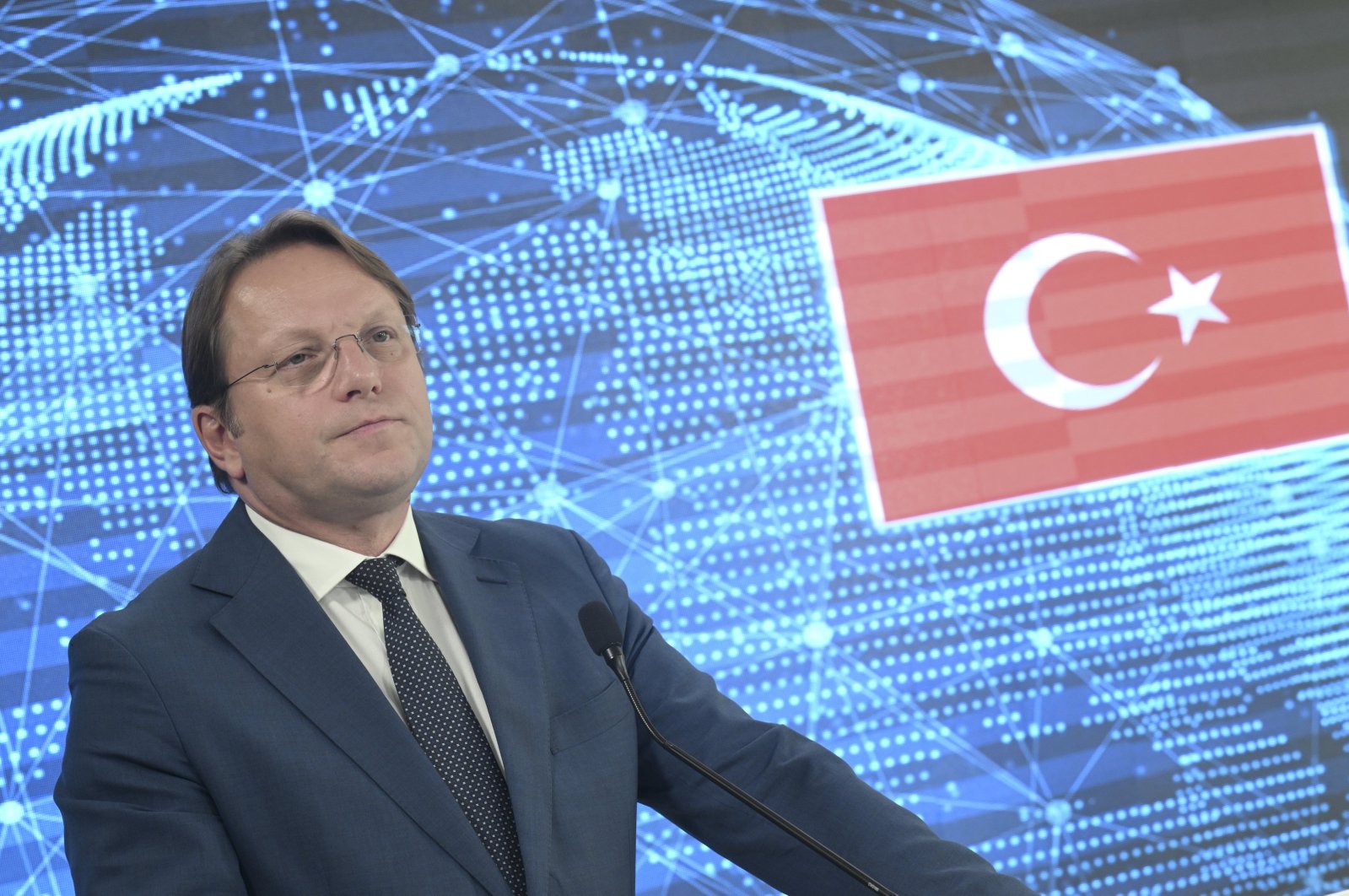
Türkiye and the European Union need a shared understanding regarding the future of relations, which requires efforts from both parties to succeed, EU Commissioner Oliver Varhelyi told the European Parliament in Brussels Tuesday.
"Our relations with Türkiye are key for us,” Varhelyi said as the parliament assembled to discuss the 2022 annual report on Türkiye, which is expected to pass at parliament today.
Highlighting Türkiye’s status as an EU candidate, a NATO ally, a close neighbor and a key partner for stability and security of the Middle East, the South Caucasus, and the Black Sea regions, Varhelyi said the bloc has a "strategic interest” in the development of a cooperative and mutually beneficial relationship with the country.
"There is a significant potential for the advancement of our relations across various areas of shared interest, notably the digital and green transition, economy, energy, migration and assistance to refugees and host communities,” Varhelyi said.
The sides could also move quickly forward in areas like Customs Union, visa facilitation, energy and technology, investments, and food security, the commissioner added, areas Türkiye is also anticipating concrete results in.
"But for the relations to develop, domestic reforms in Türkiye and a conducive political environment in our bilateral relations are necessary. The Commission will keep raising its concerns and address points of political differences.”
The accession negotiations with Türkiye remain at a standstill, Varhelyi recalled and emphasized that dialogue on issues like European Court of Human Rights rulings is "an integral part” of the Türkiye-EU relationship.
The said relationship, especially through Türkiye’s stalled membership process, has come to the fore in recent months after President Recep Tayyip Erdoğan pushed to revive accession talks after the NATO summit in July.
The bloc seeks to iron out differences on several issues and progress in political aspects of the "Copenhagen Criteria” Türkiye must fulfill for membership, including nine chapters, high-level dialogue meetings, counterterrorism efforts, security and defense, financial cooperation and communications.
As the summer recess in EU bodies ends, the pair is looking to give another try for full membership talks in the coming months.
Before the break in June, the European Council asked Varhelyi’s office to analyze the nature of EU-Türkiye relations and possible ways of a new and positive agenda with the country.
The commission will soon publish this year’s annual report, Varhelyi also informed.
The Türkiye Investment Platform, which was launched last year, is fully operational now, the commissioner added, noting that the bloc continues taking actions in the rehabilitation and reconstruction of Türkiye’s southeastern region devastated by two earthquakes in February.
"The Commission was quick to mobilize international partners to support the reconstruction and the Commission will ensure that the full mobilization of the 1 billion euros EU pledge takes place swiftly. We have already implemented 115 million euros in humanitarian aid. We have also finalized another package of 417 million euros for earthquake relief,” Varhelyi said.
On migration, the commissioner thanked Türkiye for hosting 4 million refugees from Syria for years and said he signed a flagship project of 781 million euros to cover the basic needs of 2 million refugees in Türkiye during his visit to Ankara last week.
"We must be aware that continued EU assistance is essential, also beyond 2023. The Commission is committed to continue the significant European support to refugees and host communities in Türkiye, fit for the current realities on the ground,” Varhelyi said.
While praising Türkiye’s support of Ukraine’s territorial integrity and efforts to revive the Black Sea grain initiative, which plays an important role in ensuring global food security, Varhelyi also called on Türkiye to "remain engaged with the EU on implementing sanctions against Russia.”
He welcomed the drop in tensions with archrival Greece in the wake of the February earthquakes, highlighting that ensuring a stable and secure Eastern Mediterranean is of "utmost importance.”
"In that context, progress on the Cyprus issue is also indispensable,” Varhelyi said. In addition to their various problems, as guarantor nations Türkiye and Greece are also at odds over the Mediterranean island that has been split between Turkish and Greek Cypriots since 1974.
Türkiye has the most extended history with the union and the most prolonged negotiation process. The country signed an association agreement with the EU’s predecessor in 1964, the European Economic Community (EEC), which is usually regarded as a first step to eventually becoming a candidate.
Applying for official candidacy in 1987, Türkiye had to wait until 1999 to be granted the status of a candidate country. For the start of the negotiations, however, Türkiye had to wait for another six years, until 2005, a uniquely long process compared with other candidates.
Recently, Fidan stated it was "strategic blindness” to hinder Türkiye’s EU membership process. "It is essential to have a visionary view of Turkish-EU relations in the new era and revive the process with the perspective of full membership.
This "blindness” cost Türkiye over five decades, as the process adhered to a course based on "need” for each other rather than joint strategic goals, and trust for each other for both parties has long been low.
